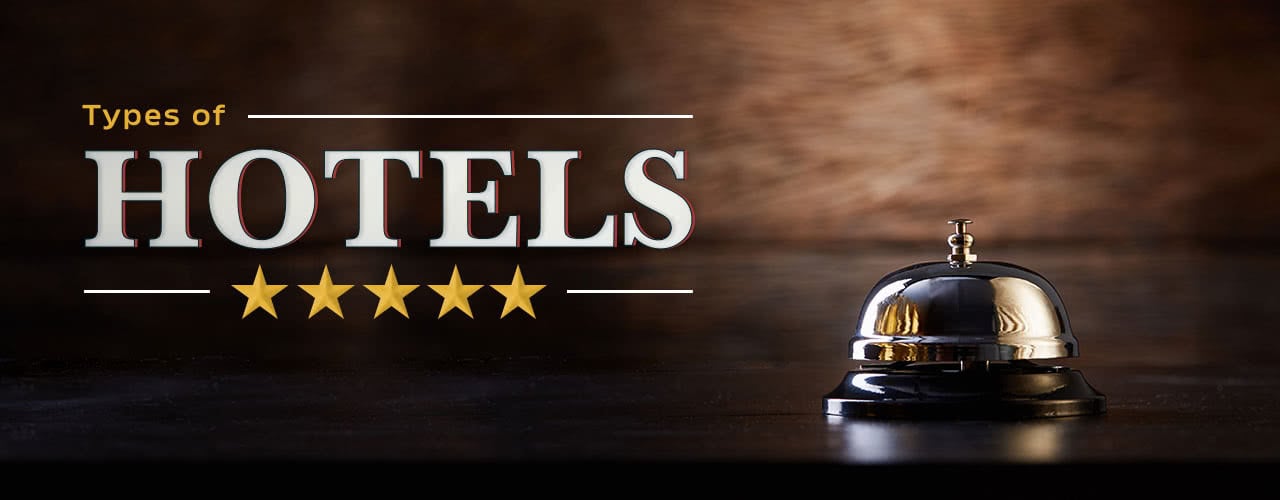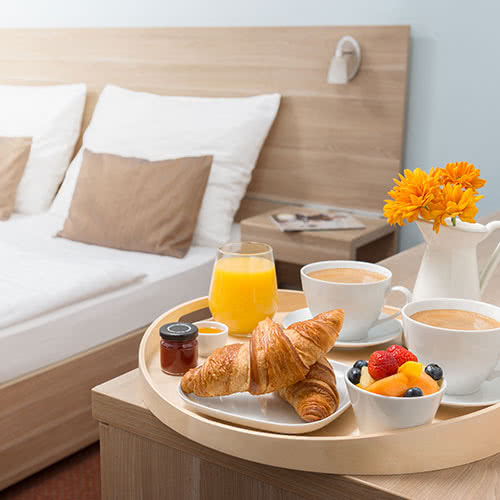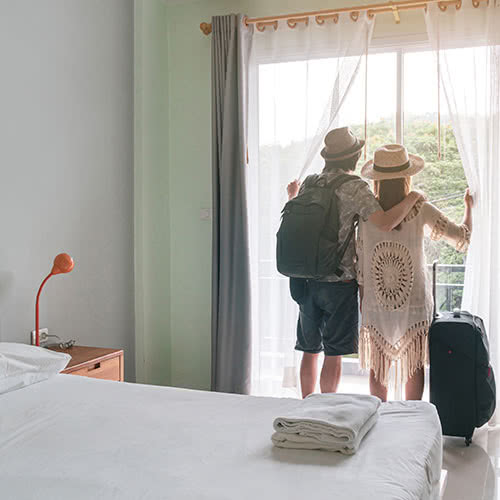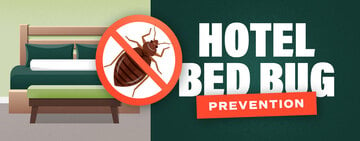
Hotels are the foundation of the accommodations sector and play a vital role in the hospitality industry. Travelers of every nature, whether they travel for business or recreation, require overnight lodging while they are away from home. Within the travel industry, there are different types of hotels to suit the budget and lifestyle of any guest. If you’re seeking a career in hospitality or thinking of opening your own vacation rental business, read on to familiarize yourself with the different hotel categories, the services they offer, and their staff requirements.
Shop All Hotel Room SuppliesHotels

The larger hotel industry is named for the most common type of paid lodging, the hotel. To be classified as a hotel, an establishment must contain multiple rooms with en suite (connected) bathrooms. When entering the building, guests are greeted by a reception desk where they check in for temporary lodging. Many hotels have multiple floors that are connected by a centrally located elevator.
Hotels are often identified by star ratings that indicate the affordability of the rooms and the level of service and amenities offered. Some hotels are no-frills establishments with very few services and others offer continental breakfast, swimming pools, fitness rooms, and business centers. The definitions of star ratings vary across different review sites, but generally a 1-star hotel is considered the most budget-friendly and a 5-star hotel is the most luxurious, upscale option.
Hotel Features
The following features are considered unique to hotels and differentiate them from other types of hospitality businesses:
- Target Customer - Vacationers, business travelers
- Staff Requirements - Management, reception, housekeeping, maintenance, restaurant and bar staff
- Amenities - Coffeemaker, mini-fridge, microwave, ice bucket, television, telephone, bed linens, towels, toiletries
- Services - 24 hour reception, room cleaning, wake-up calls, room service, laundry service, onsite dining, fitness room, business center
Motels
Motels and hotels are often mixed up despite being two different types of businesses. In structure, hotels have multiple floors with blocks of rooms accessible by interior hallways. Motels are built so each room is accessible from outside the building. They commonly have one or two floors and no elevator. Instead of a front desk area, guests enter a front office to inquire about vacancies. Targeted towards customers traveling in their vehicles, motels are situated along busy roads and have ample parking. Motorists can pull into a motel and access their guest room directly from the parking lot.
Motel Features
The features listed below make motels unique:
- Target Customer - Roadtrippers, business travelers, truck drivers
- Staff Requirements - Management, reception, housekeeping, maintenance
- Amenities - Television, telephone, bed linens, towels
- Services - Room cleaning
Bed and Breakfasts
Bed and breakfasts are popular options for travelers looking for a personal, home-away-from-home feel to their lodging. Romantic and quaint, B&Bs are usually located inside of historical homes with rooms converted into guest rooms. It’s common for each room to have a name, a theme, and unique decor. Touches like canopy beds, old-fashioned wallpaper, and antique clawfoot bathtubs have been a trademark of bed and breakfasts, but it’s also possible to find businesses that have broken out of this mold. The commonality between all bed and breakfasts is the inclusion of a homemade breakfast served in a communal room for all overnight guests. Bed and breakfasts are usually operated solely by the owner, who may live on site.
Bed and Breakfast Features
The following features are specific to bed and breakfasts and set them apart from other businesses:
- Target Customer - Honeymooners, vacationers
- Staff Requirements - Owner, cleaning service
- Amenities - Toiletries, bed linens, towels, snacks, beverages
- Services - Homemade breakfast, housekeeping
Inns

Inns are similar to B&Bs because they are often converted from buildings like historical mansions, farmhouses, or boarding houses. Anchored by a tavern or restaurant, inns are larger than bed and breakfasts and provide more privacy. Inns differ from hotels because they are usually located in small towns or rural locations.
Inn Features
The features listed below are specific to inns and help to make them unique:
- Target Customer - Honeymooners, vacationers, roadtrippers
- Staff Requirements - Management, reception, housekeeping, restaurant and bar staff
- Amenities - Toiletries, bed linens, towels, snacks, beverages
- Services - Onsite dining, room cleaning, room service
Boutique Hotels
Boutique hotels are a relatively new style of lodging. Where standard hotel chains usually feature the same design and decor throughout every location, regardless of city, boutique hotels are all singularly unique. Great emphasis is placed on making each boutique hotel feel like a one-of-a-kind business with decor that highlights design trends and local art. Modern, space-saving furnishings are used in guest rooms. You’ll find these mini-hotels in popular cities and tourist destinations.
Boutique Hotel Features
Boutique hotels share the following features which differentiate them from other types of hotels:
- Target Customer - Vacationers, business travelers
- Staff Requirements - Management, reception, housekeeping, maintenance, restaurant and bar staff
- Amenities - Coffeemaker, mini-fridge, microwave, ice bucket, television, telephone, toiletries, bed linens, towels
- Services - 24 hour reception, room cleaning
Back to Top
Resorts
Resorts are large complexes made up of guest rooms, recreational facilities, outdoor spaces, and multiple dining options. You’ll find resorts located near popular attractions like beaches, national parks, and tourist destinations. Targeted towards vacationers seeking a travel experience, resorts may have multiple pools, private beach clubs, and guided excursions. Because they are so large, resorts require a considerable amount of square footage to be built and they employ many staff members. It's common for resorts to attract business by offering all-inclusive packages, in which customers pay a flat rate to receive lodging, meals, alcoholic beverages, and other onsite services.
Resort Features
The features listed below are unique to resorts:
- Target Customer - Honeymooners, vacationers
- Staff Requirements - Management, reception, valet, housekeeping, maintenance, restaurant and bar staff, tour guides, lifeguards
- Amenities - Minibar, coffeemaker, ice bucket, television, telephone, toiletries, bed linens, towels
- Services - 24 hour reception, room cleaning, concierge service, bellhop service, room service, onsite dining, fitness room, spa, indoor / outdoor pools, private beach access, golf courses, excursions
Vacation Rental Homes

Vacation rental homes are residential locations operated by one owner or a property management group that can be rented on a weekly basis. They are typically located in areas travelers want to visit, like beaches, lakes, ski resorts, and other tourist destinations. The level of amenities varies from home to home and is reflected in the weekly rental rate.
Vacation homes are a popular choice for families or large groups. Instead of paying for several hotel rooms, renters can secure an entire home and gain access to multiple bedrooms and a full kitchen. Thanks to the website Airbnb, it’s easy for homeowners to post their rental listing and be immediately connected with customers from all over the world. Rental homes require no staff for operation but do need to be cleaned by the owner or an outside service after every stay.
Vacation Rental Features
Below, you'll find a list of features that set vacation rentals apart from other rental properties:
- Target Customer - Vacationers, honeymooners, roadtrippers, business travelers
- Staff Requirements - None
- Amenities - Varies from rental to rental
- Services - None
Timeshares
Timeshares are a type of resort or hotel that operates under divided ownership. The property of the resort is owned and operated by a management company, but individuals buy into the timeshare and are granted the right to use a guest unit during a specific week of the year. Owners have access to their unit during the same week every year unless they decide to trade in their week for a weeklong stay at another resort owned by the same company.
Like resorts, timeshares are located near tourist attractions and offer a variety of services and recreational activities. Because they cater to guests returning year after year to use their timeshare week, there is more of a personal feel to timeshares. Many offer unique perks to attract prospective buyers.
Timeshare Features
Continue reading to learn about a variety of features which set timeshares apart from other sectors of the hospitality business:
- Target Customer - Vacationers
- Staff Requirements - Management, reception, housekeeping, maintenance, restaurant and bar staff, lifeguards
- Amenities - Full kitchen, television, telephone, bed linens, towels
- Services - Reception, onsite dining, fitness room, spa, indoor / outdoor pools, private beach access, golf courses, excursions
Hostels
Targeted towards students and world travelers, hostels offer basic accommodations and are located in popular cities. What they lack in services, they make up for in affordability and convenience. Hostels are made up of a collection of private rooms, dormitory-style rooms, and communal bathrooms. Guests are given access to a shared kitchen and living space.
Hostels are designed to attract long-term travelers on a budget. They offer a communal atmosphere where guests can socialize with each other, which is attractive to solo travelers. The hostel staff usually plays many roles by manning the reception desk, giving tours, and planning social activities. They also perform housekeeping duties and wash bed linens and towels.
Hostel Features
Hostels are defined by the following features which make them unique:
- Target Customer - Students, solo travelers, backpackers, roadtrippers
- Staff Requirements - Reception
- Amenities - Communal bathroom, kitchen, laundry, and living spaces
- Services - Guided tours, social activities, movie nights
Back to Top
Tourism is supported by the hotel industry and the different types of accommodations available to travelers. Whether your guests are looking for a place to lay their head for the night or a luxurious week long vacation, there are many different types of hotels that fulfill the basic need for safe, secure lodging.





